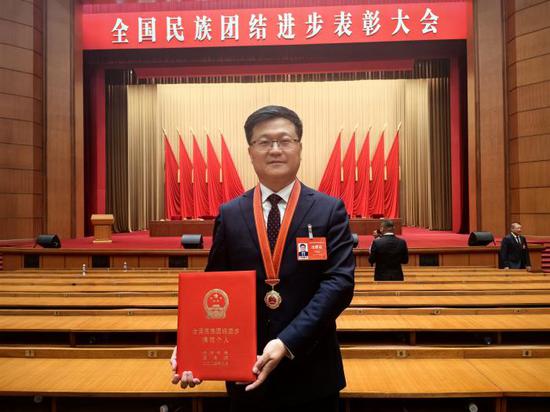Medical aid boosts healthcare services in Xizang : doctor Sun Shuxue
By Xue Lingqiao and Lin Mengnan
(ECNS) -- "My child won't have survived without the efforts of doctors from Beijing."
In April 2021, while consulting with patients, Beijing experts aiding Xizang noticed a Tibetan woman, who was 35 weeks of pregnant, and suffering from severe edema, polyhydramnios, and significant accumulation of pleural effusion.
At this critical moment, Sun Shuxue, a doctor from Beijing Chest Hospital, Capital Medical University, led a cross-disciplinary emergency team—combining Beijing's aid-team specialists and maternal-fetal experts, began a race against the clock.
A life relay on the plateau
Fetal pleural cavity puncture, amniotic fluid reduction... In order to buy time to save the newborn and increase its chances of survival, advanced medical techniques previously only performed in specialized maternal-fetal centers were implemented for the first time in the plateau area.
From endotracheal intubation, abdominal fluid drainage, to closed thoracic drainage, thanks to intrauterine pleural decompression and a meticulously-crafted neonatal rescue plan, the team secured the precious time. Once the newborn's vital signs were stabilized, the infant was transferred to the Intensive Care Unit (ICU) for further care. A new life had been brought into the world on the high plateau.
"On the day the child was discharged, the parents presented us with a Khata scarf and a banner of gratitude. The father was moved to tears," recalled Sun Shuxue, who participated in Beijing's three-year medical aid program in Xizang from 2019 to 2022, working at Lhasa People's Hospital. Even three years after returning to Beijing, this cross-disciplinary rescue experience remains a vivid memory.
"Cases like this happened every day at Lhasa People's Hospital. My fellows and I felt great fulfillment, knowing that we were saving lives."
A self-sustaining medical team
"When I began my aid work at Lhasa People's Hospital in 2019, I observed a noticeable gap in medical technology, management and services compared to advanced practices in Beijing and other major cities," Sun Shuxue recalled, realizing the weight of his responsibilities upon arriving in Lhasa.
Disparities such as incomplete clinical departments, underdeveloped diagnostic and treatment capabilities for certain diseases, limited adoption of advanced techniques, and an infant hospital management system. All of these were challenges Sun aimed to address during his tenure.
Starting with institutional reforms, Sun collaborated with Beijing-based experts to swiftly formulate a hospital development plan tailored to Lhasa People's Hospital's needs. To tackle its weaknesses, he requested annual dispatches of specialized medical professionals and experts from the Beijing Municipal Health Commission for targeted support.
"Through mentorship models like 'master leading apprentice' and 'expert leading team ,' aiding experts from Beijing have focused on cultivating local medical talent in Xizang. We teach them how to diagnose, perform procedures, conduct surgeries, and of course, how to manage and operate a modern tertiary hospital," Sun Shuxue emphasized. In his view, the ultimate goal of aiding efforts is to leave behind a self-sustaining medical team that remains rooted in the region.
"The progress of medical aid to Xizang isn't just reflected in the growing number of healthcare workers," Sun said, adding that what truly matters is the enhancement of local hospitals' comprehensive capabilities, the optimization of talent structures, and the development of self-driven learning, growth, and renewal abilities among medical professionals in Xizang.
Currently, with the support of Beijing's medical team, Lhasa People's Hospital has trained skilled midwives across the region, equipping them with standardized delivery capabilities and services to enhance the treatment of critically ill pregnant women and newborns. Additionally, specialized training courses have also been organized to improve the skills of grassroots doctors in Xizang.
"Based on these efforts, it can be seen that the local medical treatment capacity has basically improved, transforming from assistance acceptance to self-training and even providing healthcare coverage, which marks a significant leap," Sun said, reflecting on his three-year experience in Xizang. He emphasized that the most gratifying progress lies in the transformative shift in medical talent development models.
An honor lifted by hands
In September 2024, Sun was awarded the honorary title of the Role Model
for Ethnic Unity and Progress, recognizing his outstanding contributions to Xizang's medical development.
During the awarding ceremony, as a representative of Beijing, Sun was among the first to receive his medal and certificate and stood with proud onstage. Reflecting on the moment, he noticed many fellow model individuals for ethnic unity and progress still waiting offstage, their certificates and medals were yet to be distributed.
"Could we take a photo using your medal and certificate first?" they asked.
"So this is what the medal and certificate look like."
Through Sun Shuxue's account, we noticed faint handprints of other model representatives lingering on his certificate of honor.
"These handprints symbolize ethnic unity, as everyone's hearts are connected," he said.
"I believe this honor is also lifted by the hands of countless cadres who dedicate themselves to aiding ethnic regions."
"Receiving this title makes me feel somewhat unworthy, as I could have done more," Sun remarked when reflecting on the recognition. "My immediate goal is to lead the team in providing continuous aid to Lhasa for a decade after my seven years of aiding services on the plateau. There's still so much more I can contribute," added Sun.
After returning to Beijing upon completing their aiding missions in Xizang, Sun and his fellows continue to regularly revisit Xizang to conduct talent cultivation programs and specialized support projects. In his view, it is vital to sustain the spirit of aiding Xizang and nurture the profound friendships forged with people of all ethnic groups.
"In this way, we have truly realized the vision of Beijing and Xizang united as one family, making progress together."

